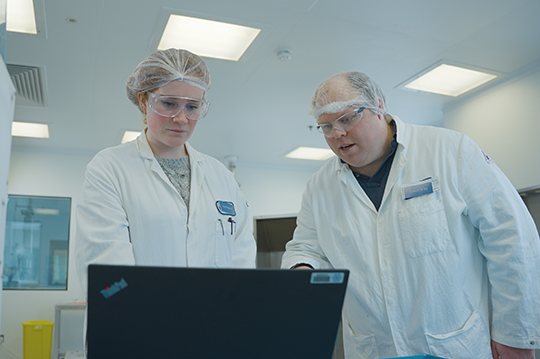Forging the Future with the University of Birmingham: The power of industry and academic PhD partnerships
Article authored by Zoë Whalley (EngD student). Zoë studies with the Drug Product Development team at Bristol Myers Squibb in Moreton, in collaboration with the University of Birmingham.
I never thought I’d spend my days fiddling about with printers. In 2020, when working as a contract Analytical Development Scientist at Bristol Myers Squibb’s research and development site in Moreton, I had the opportunity to get involved with the 3D print team in addition to my regular role. I’d always been fascinated by how 3D printers work, and I learnt a lot from taking them apart and putting them back together when they (frequently) got jammed.
During lockdown, I was able to print Personal Protective Equipment (PPE) mask extenders for fellow employees around the Moreton site. I also used them to produce printed tablets for a cross-site study with our New Brunswick site in the US, as part of the Oral Product Development (OPD) team. The tablets were designed to investigate how shape and surface area can affect release of the drug in the body. It was this initial step into the world of research that sparked my interest, and I quickly realised I wanted to continue to explore innovation and pursue an Engineering PhD (EngD).
Fortunately, Bristol Myers Squibb had an existing partnership with the University of Birmingham via its Formulation Engineering Centre for Doctoral Training (CDT) and so I applied for the programme. The CDT scheme allows students to carry out research in the same way as a normal PhD, but facilitates industrial collaborations across multiple industries such as pharmaceuticals, personal care, food, and fine chemicals, promoting the investigation and study of real-world issues.
I’m now 18 months into my PhD, which is also based at the Moreton site, where I’m studying 3D printed drug tablets to further our understanding of their manufacturing process and mechanism of drug release in the body. Using chemical imaging I’m able to detect the presence, interactions, and precise location of different tablet components, giving an insight into the mechanism of how the drug is released and what will happen when it’s administered to patients. I’m also focussed on developing Process Analytical Technologies (PAT) to monitor the manufacturing process of the 3D printed tablets, which allows us to be sure of the quality in the final 3D printed product.

As individual patient requirements become an ever-greater focus for pharmaceutical development, I hope that my work will contribute to the creation of novel medicines and treatments that can be tailored to the needs of individual patients.
Studying for my EngD in partnership with Bristol Myers Squibb and the University of Birmingham has given me the best of both worlds. I have the benefit of being a student, where I’m able to drive my own development with the freedom to explore my own research ideas, alongside access to state-of-the-art equipment and resources provided by Bristol Myers Squibb. This combination means I’m learning from top scientific minds around the globe, with support from leading academics and industrialists, all while having access to consistent learning opportunities through designated University modules.
I’m thankful for the opportunity to carry out my PhD in partnership with the University of Birmingham and Bristol Myers Squibb, and I’m excited to continue my journey as a scientist, to help develop and deliver treatments for patients that need it most.
These ongoing partnerships with UK universities allow Bristol Myers Squibb to build relationships and collaborations with world class academics in the UK. Often an initial PhD research project can lead into lasting and meaningful research interactions. Research students have the time to concentrate on research projects that can support product development in the future. This can then drive innovation and improvement of scientific processes within the company. The students benefit from access to all of the academic know how and research skills from the university side. From the industrial side they can access the hardware resources and diverse range of scientists as well as being exposed to a constant stream of real-world problems.

Patrick Wray, Senior Principal Scientist BMS
The CDT programme has allowed Birmingham academics to work closely with the pharmaceutical sector for over two decades now. The company gains access to expertise and equipment at the University, whilst being able to train the next generation of scientists and engineers.
Tom Mills and Richard Greenwood, University of Birmingham
NO-GB-2300134
June 2023